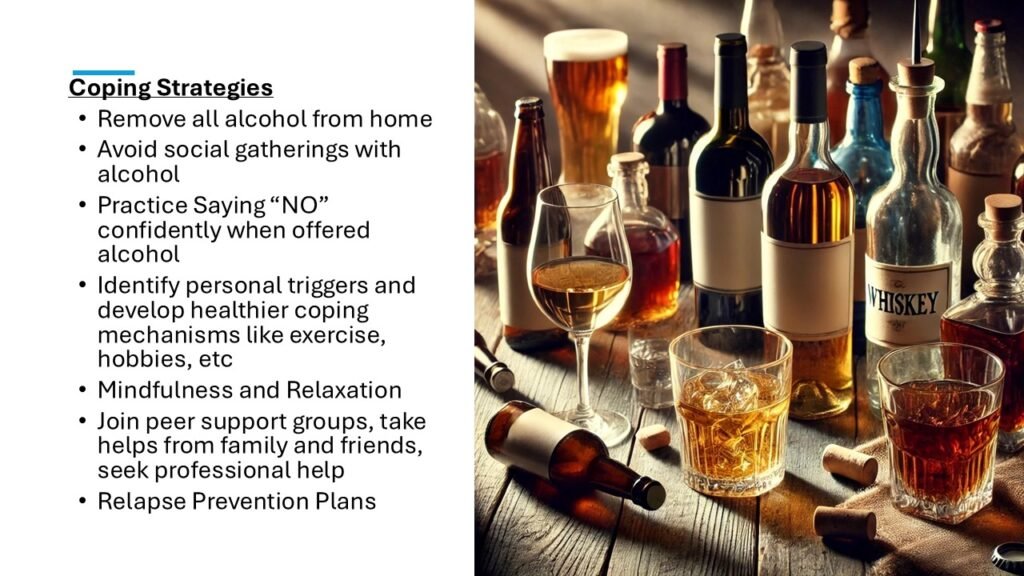Introduction
Quitting alcohol can feel like a huge challenge, but it’s important to remember that it’s possible, and many people have done it successfully. Alcohol can seem like a way to relax or have fun, but over time, it can cause serious problems. It affects not only your health but also your relationships, school or work performance, and even your mood. If you’re thinking about how to quit alcohol, you’re already taking the first step toward a healthier, more fulfilling life.
Imagine being able to wake up every day feeling clear-headed, full of energy, and in control of your life. That’s what quitting alcohol can offer. It’s about more than just giving up drinking—it’s about gaining a healthier, happier life.
In this essay, we’ll explore some helpful ways to quit alcohol. These are strategies that anyone can use to stay strong, even when things get tough. Whether you’re just starting to think about quitting or already on your journey, these tips can help you along the way. So, let’s dive into how you can break free from alcohol and start living your best life!
Understanding the Need to Quit Alcohol
It’s important to understand why quitting alcohol matters (Click Here To Know More). Drinking too much alcohol can seriously hurt your body and mind. For example, it can damage your liver, which is important for keeping your body healthy, and it can make it harder to think clearly, causing problems with memory and decision-making.
Alcohol doesn’t just affect your health, though. It can also cause problems with your relationships, making it harder to connect with friends and family. It can lead to trouble at school or work, and even create money problems because of how much you spend on it.
One of the best ways to quit alcohol is by thinking about your personal reasons. Maybe you want to feel healthier, improve your relationships, or save money. Whatever your reason, holding onto that motivation can make it easier to stay on track when things get tough.

Setting a Quit Plan
When it comes to quitting alcohol, having a plan is super important. A quit plan is like a road map that guides you step by step. It helps you stay focused and gives you a clear idea of what to do next.
One of the first things to do is set realistic goals. Some people might quit alcohol all at once, but for others, it might work better to slowly cut back over time. Both ways can work—it just depends on what feels right for you.
A great way to set your goals is by using something called the SMART method. This means your goals should be:
- Specific: Know exactly what you want to achieve.
- Measurable: Make sure you can track your progress.
- Achievable: Set goals you can actually reach.
- Relevant: Make sure it’s important to you.
- Time-bound: Give yourself a deadline to stay on track.
By following a plan like this, quitting alcohol can feel a lot more doable!
Coping Strategies for Managing Triggers
When you’re trying to quit alcohol, there are certain things, called triggers, that can make you want to drink. Learning how to manage these triggers is key to staying on track.
First, a good strategy is avoidance and making changes to your environment. This means taking alcohol out of your house so it’s not around to tempt you. It also helps to avoid places where drinking is common, like certain parties or hangouts, especially in the beginning.
Next, you’ll need to work on managing social pressures. Sometimes friends or people around you might offer you alcohol or expect you to drink. In these situations, it’s important to learn how to say “no” confidently. You can practice saying things like, “I’m not drinking tonight” or “I’m focusing on being healthy.”
Lastly, it’s important to identify your personal triggers. These can be things like feeling stressed about school, work, or relationships. Once you know what makes you want to drink, you can come up with healthier ways to cope, like exercising, talking to a friend, or doing something fun that doesn’t involve alcohol.
By using these strategies, you’ll be better prepared to handle situations that might make you want to drink!
Behavioral and Cognitive Coping Techniques To Quit Alcohol
When trying to quit alcohol, learning new ways to think and act can make a big difference. These techniques help you manage cravings and stress without turning to alcohol.
One helpful method is Cognitive Behavioral Therapy (CBT). This type of therapy helps you change the way you think about drinking. For example, if you feel like alcohol is the only way to relax, CBT can help you reframe that thought and show you healthier ways to calm down, reducing your cravings.
Another great way to manage stress is through mindfulness and relaxation. Techniques like meditation, deep breathing exercises, and yoga can help you feel more in control when things get stressful. They give your mind and body a break, helping you relax without needing alcohol.
Finally, it’s important to develop new hobbies. When you quit drinking, you might find you have more time and energy. Filling that time with fun, productive activities—like sports, drawing, or learning a new skill—can help distract you from cravings and give you something positive to focus on.
By using these coping techniques, you can build healthier habits and keep moving forward on your journey to quit alcohol.
Support Systems and Accountability To Quit Alcohol
Quitting alcohol is easier when you have support from others. Having people who understand what you’re going through can really help keep you on track.
One option is peer support. Joining groups like Alcoholics Anonymous (AA) or online support forums can be super helpful. These groups are full of people who are also trying to quit alcohol, and they share tips, stories, and encouragement. It feels good to know you’re not alone, and others are cheering you on.
Your family and friends can also play a big role. Letting them know you’re trying to quit can help create accountability. They can encourage you, keep an eye on your progress, and offer emotional support when things get tough. Sometimes, just talking to a friend can make a huge difference.
Lastly, getting professional help can be really important. A therapist or counselor can help you dig deeper into why you drink and teach you ways to make lasting changes. They can guide you through tough times and give you strategies that are tailored just for you.
With support from groups, loved ones, and professionals, quitting alcohol becomes a lot more manageable!
Handling Relapses
When you’re trying to quit alcohol, it’s important to understand that relapses—or slipping up and drinking again—can happen. It’s a normal part of the recovery process, and it doesn’t mean you’ve failed. What matters is how you handle it afterward.
One way to stay on track is by creating a relapse prevention plan. This plan helps you figure out what went wrong during the relapse and how to avoid those same triggers next time. It’s about learning from the slip and adjusting your coping strategies so you’re better prepared in the future.
If relapses keep happening, it might be a good idea to seek professional support. A counselor or therapist can help you understand why you’re having a hard time staying sober and work with you to create a stronger plan for the future.
Remember, relapses are just bumps in the road, and with the right help, you can get back on track!
Long-Term Maintenance
Once you’ve quit alcohol, the next step is to keep it up for the long term. This means building a sustainable lifestyle that helps you stay healthy and happy without alcohol. Focusing on good nutrition, regular exercise, and taking care of your mental health are all important parts of this. When you feel good physically and mentally, it’s easier to stay away from drinking.
It’s also important to celebrate milestones. Every small victory, like one week or one month of staying sober, is something to be proud of! These little celebrations can help remind you how far you’ve come and keep you motivated to stay on track.
Finally, don’t forget to keep using your support networks. Whether it’s family, friends, or a group like Alcoholics Anonymous (AA), having people to talk to and lean on makes a big difference in maintaining your sobriety. They’ll be there to cheer you on and help you stay strong in your commitment to quit alcohol.
Example: Rahul’s Story
Rahul used to drink alcohol whenever he felt stressed or upset. After realizing it was starting to affect his schoolwork and friendships, he decided to quit. At first, it was really hard for him because he didn’t know what to do when he felt the urge to drink.
Rahul started using some coping strategies. First, he made a plan to quit, starting by removing all alcohol from his house and avoiding parties where there was a lot of drinking. When his friends offered him alcohol, he practiced saying, “No thanks, I’m focusing on my health.”
Rahul also figured out his triggers—like feeling stressed after a tough day at school. Instead of reaching for a drink, he started going for runs or doing breathing exercises to calm down. He also joined a support group where he could talk to others going through the same thing. They shared tips and cheered each other on.
A few months later, Rahul noticed he felt healthier, more focused, and proud of how far he’d come. His coping strategies helped him handle the tough moments and stay on track. This shows how important it is to have a plan and healthy ways to deal with cravings when you’re quitting alcohol!
By using these strategies, you’ll be better prepared to handle situations that might make you want to drink!
Conclusion
Quitting alcohol isn’t easy, but using a comprehensive, multi-faceted approach can make it possible. This means tackling it from all sides—having a plan, learning coping strategies, and getting support from the people around you. By doing this, you give yourself the best chance to succeed.
It’s important to remember that persistence is key. There may be tough days, but sticking with it and reaching out for help when needed can make all the difference. Support from friends, family, or groups, combined with the right coping strategies, can help you stay strong.
If you’re thinking about quitting alcohol, take that first step. Whether it’s talking to someone or creating a plan, starting your journey is the most important part. You don’t have to do it alone—there’s help available, and you can do this!
With these strategies, you can build a healthy, alcohol-free life for the long haul!
